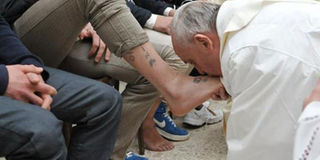Of the conscience, faith and liberal theology

Pope Francis kisses the feet of a female(L) and male (R) inmate on Holy Thursday early this year. AFP Photo.
What you need to know:
Shall we follow our conscience to live up to Godly expectations?
Just in case you are thinking of even toying with the idea of disbelief in God, the Bible, for one, already has a word or two for you. Chief among these is the popular, “A fool says there is no God.”
Now consider that the custodian of the biggest Christian sect on earth, the pope, whose opinion on Christian doctrine is unquestionable for many, thinks that it is actually okay for one not to believe in God.
“You ask me if the God of the Christians forgives those who do not believe and who do not seek the faith. I start by saying – and this is the fundamental thing – that God’s mercy has no limits if you go to Him with a sincere and contrite heart. The issue for those who do not believe in God is to obey their conscience,” he wrote in an open letter, to the founder of the La Repubblica newspaper, Eugenio Scalfari in September.
He added, “Sin, even for those who have no faith, exists when people disobey their conscience.”
Suddenly, the Pope, it seemed had thrown a spanner in the works, at the possibility of countering plain scripture. It is okay if you did not believe in God, he said – as long as you are obeying your conscience.
And by this, the Pope not only was he saying that atheists, who are true to their conscience, may indeed get to heaven, he was also implying that Christian believers, who are not true to their conscience, have no place in heaven.
It was the latest in recent signs of just how liberal Pope Francis I’s papacy is. Only in July, he told journalists that, “If someone is gay and is searching for the Lord and has good will, then who am I to judge him?”
In stating what he said, Pope Francis was only adding voice to a long line of religious leaders and scholars who have scaled conscience higher than even religious leaders. St Thomas Aquinas, a cleric and philosopher from the 1200s, wrote that, “It is better to perish in excommunication than to violate one’s conscience.”
Catechism teachings of the Roman Catholic also state that, “A human being must always follow the certain judgment of his conscience. If he were to deliberately act against it, he would condemn himself.”
Even Pope Benedict XVI, wrote, “Over the pope as the expression of the binding claim of ecclesiastical authority, there still stands one’s own conscience, which must be obeyed above all else, if necessary even against the requirement of ecclesiastical authority.”
Taking these opinions of church leaders, as the somewhat authoritative opinions on theology that they are, it turns out that the church places individual conscience at a very high pedestal.
But, in light of what Pope Francis I wrote, regarding belief in God, it becomes pertinent to define what conscience is. The Catholic Catechism defines it as God’s law, on right and wrong, written into our lives, driving us to do good and avoid evil.
One, thus, cannot separate conscience from God’s will. “When he listens to his conscience, the prudent man can hear God speaking,” reads a section of Article 6, Part 3, of the Catechism of the Catholic Church.
Is it then possible for one’s conscience to drive them to believe that there is no God, now that we know the conscience derives its existence from God?
When writing in his epistle to Timothy in the Bible, Paul talks about those with a “good conscience,” something that may point to the possibility of the existence of more than one form of conscience.




